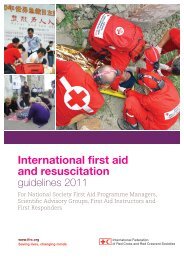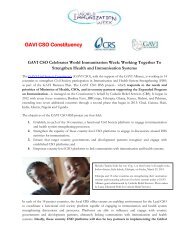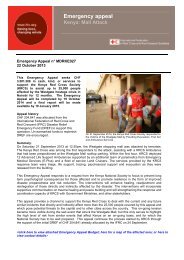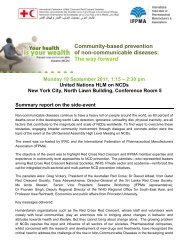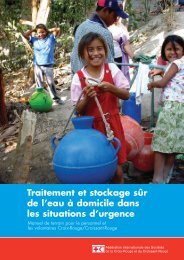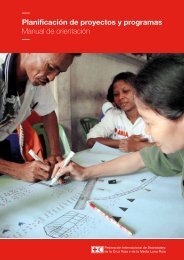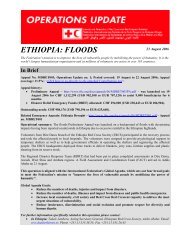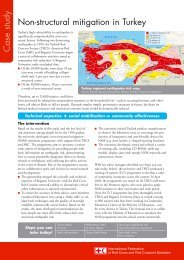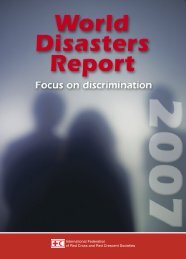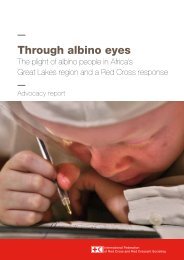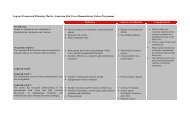- Page 2: The International Federation of Red
- Page 5 and 6: World Disasters Report 2010 Focus o
- Page 7 and 8: Contents International Federation o
- Page 9 and 10: Chapter 6 Urbanization and climate
- Page 11 and 12: Annex 2 Making cities resilient: A
- Page 13 and 14: annually despite commendable effort
- Page 15 and 16: Avoiding the urbanization of disast
- Page 17 and 18: in low-income nations even though a
- Page 19 and 20: The last few decades have also brou
- Page 21: But only a very small proportion of
- Page 25 and 26: institutions. Poor people have a lo
- Page 27 and 28: Box 1.2 Can Haiti build back better
- Page 29 and 30: was ‘illegal’, makes reconstruc
- Page 31 and 32: that the needs and priorities of th
- Page 33 and 34: Ravallion, M., Chen, S. and Sangrau
- Page 35 and 36: Urban disaster trends It is well kn
- Page 37 and 38: about 65 per cent of the world’s
- Page 39 and 40: With the exception of the South Asi
- Page 41 and 42: fires and traffic accidents. Buildi
- Page 43 and 44: large cities in low- and middle-inc
- Page 45 and 46: Figure 2.5 Port cities with highest
- Page 47 and 48: expansion is driving risk in many A
- Page 49 and 50: know the phone number) and the fire
- Page 51 and 52: However, the incentive for owners t
- Page 53 and 54: The focus on assets, especially hig
- Page 55 and 56: Munich Re Group. Topics Annual Revi
- Page 57 and 58: Starting over: Community rights and
- Page 59 and 60: on this. However, it is complicated
- Page 61 and 62: all those in the evacuation centre)
- Page 63 and 64: those affected, help them get organ
- Page 65 and 66: disaster events. Governments often
- Page 67 and 68: In urban areas, rebuilding homes an
- Page 69 and 70: ownership or other formalized/legal
- Page 71 and 72: However, the scope of the upgrading
- Page 73 and 74:
Sources and further information Ade
- Page 75 and 76:
Syukrizal, A., Hafidz, W. and Saute
- Page 77 and 78:
Urban violence As more people crowd
- Page 79 and 80:
Drug production and trafficking Sou
- Page 81 and 82:
Economic development In economic te
- Page 83 and 84:
Surrounding what happens in homes a
- Page 85 and 86:
Table 4.1 Measuring inequality Coun
- Page 87 and 88:
Crisis of legitimacy Many states wi
- Page 89 and 90:
and in a sense of hopelessness for
- Page 91 and 92:
At the same time, many of the world
- Page 93 and 94:
can help, but - as the Organisation
- Page 95 and 96:
Fukuyama, F. ‘A Quiet Revolution:
- Page 97 and 98:
Tedesco, L. Latin American States -
- Page 99 and 100:
Urban risk to health The rapid rise
- Page 101 and 102:
are malnourished, compared with 16
- Page 103 and 104:
show that prices of imported rice a
- Page 105 and 106:
pneumonia, diarrhoea, malaria, meas
- Page 107 and 108:
SARS caused near global panic for a
- Page 109 and 110:
Urban life affects the way people w
- Page 111 and 112:
The Red Cross has 90 first-aid stat
- Page 113 and 114:
private life. Equally significant a
- Page 115 and 116:
Sources and further information Bur
- Page 117 and 118:
World Economic Forum. Global Risks
- Page 119 and 120:
Urbanization and climate change ris
- Page 121 and 122:
more frequent hot days and nights,
- Page 123 and 124:
impacts of changing precipitation p
- Page 125 and 126:
feedback have all been used to help
- Page 127 and 128:
Addressing the causes of climate ch
- Page 129 and 130:
The Green Party Minister for the En
- Page 131 and 132:
The inquiry dealt only with technic
- Page 133 and 134:
Ensuring climate and disaster prepa
- Page 135 and 136:
negotiations. However, there are no
- Page 137 and 138:
to peak if the planet is to have a
- Page 139 and 140:
Sources and further information Ade
- Page 141 and 142:
Mata, J. L. and Nobre, C. Backgroun
- Page 143 and 144:
Urban governance and disaster risk
- Page 145 and 146:
the city government has developed a
- Page 147 and 148:
For many cities, including those me
- Page 149 and 150:
many such cities is participatory b
- Page 151 and 152:
due to El Niño. Many other factors
- Page 153 and 154:
all provinces by the end of 2009. T
- Page 155 and 156:
in informal settlements than in the
- Page 157 and 158:
Conclusion As we pointed out at the
- Page 159 and 160:
Fay, M., Ghesquiere, F. and Solo, T
- Page 161 and 162:
Satterthwaite, D. et al. ‘Adaptin
- Page 163 and 164:
World Disasters Report 2010 - Disas
- Page 165 and 166:
(eight windstorms, one flood, one w
- Page 167 and 168:
�� Miscellaneous accidents: Col
- Page 169 and 170:
Information systems have improved v
- Page 171 and 172:
Table 2 Total number of people repo
- Page 173 and 174:
Table 4 Total amount of disaster es
- Page 175 and 176:
Table 6 Total number of people repo
- Page 177 and 178:
Table 8 Total amount of disaster es
- Page 179 and 180:
During the decade: Asia accounted f
- Page 181 and 182:
During the decade: Medium human dev
- Page 183 and 184:
During the decade: Medium human dev
- Page 185 and 186:
During the decade: Americas account
- Page 187 and 188:
Total number of people reported kil
- Page 189 and 190:
Total number of people reported kil
- Page 191 and 192:
Total number of people reported kil
- Page 193 and 194:
World Disasters Report 2010 - Disas
- Page 195 and 196:
Making cities resilient: A ten-poin
- Page 197 and 198:
The UNDP Country Office interventio
- Page 199 and 200:
which was the 1961 flood that invol
- Page 201 and 202:
with semi-rural mountainous areas,
- Page 203 and 204:
a Federal Relief Commission and an
- Page 205 and 206:
Benin 96, 119, 136, 182 Bogotá 86,
- Page 207 and 208:
disasters 7-8, 11-16, 18, 20-22, 26
- Page 209 and 210:
high-income nations 12-13, 16-17, 1
- Page 211 and 212:
landslide(s) 21-22, 45, 56-57, 117,
- Page 213 and 214:
Oceania 12, 166-169, 174-176, 178,
- Page 215 and 216:
slum(s) 7, 11, 15, 22-23, 28, 31, 3
- Page 217 and 218:
urbanization 7-8, 11-12, 16-19, 27-
- Page 219 and 220:
The Fundamental Principles of the I



